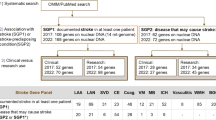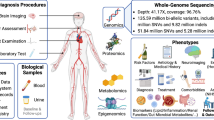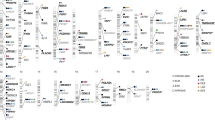Abstract
Extensive analyses of known monogenic causes of stroke by whole-exome/genome sequencing are technically possible today. We here aimed to compile a comprehensive panel of genes associated with monogenic causes of stroke for use in clinical and research situations. We systematically searched the publically available database Online Mendelian Inheritance in Man, and validated the entries against original peer-reviewed publications in PubMed. First, we selected known pathogenic or putatively pathogenic stroke genes reported in at least one person with stroke, and classified the stroke phenotype for each gene into eight subgroups: (1) large artery atherosclerotic, (2) large artery non-atherosclerotic (tortuosity, dolichoectasia, aneurysm, non-atherosclerotic dissection, occlusion), (3) cerebral small-vessel diseases, (4) cardioembolic (arrhythmia, heart defect, cardiomyopathy), (5) coagulation dysfunctions (venous thrombosis, arterial thrombosis, bleeding tendency), (6) intracerebral hemorrhage, (7) vascular malformations (cavernoma, arteriovenous malformations), and (8) metabolism disorders. Second, we selected other genes that may plausibly cause stroke through diseases related to stroke, but without any documented stroke patient description. A third section comprised SNPs associated with stroke in genome-wide association studies (GWAS). We identified in total 214 genes: 120 associated with stroke, 62 associated with diseases that may cause stroke, and 32 stroke-related genes from recent GWAS. We describe these 214 genes and the clinical stroke subtype(s) associated with each of them. The resulting gene panel can be used to interpret exome sequencing results regarding monogenic stroke. Based on the panel’s clinical phenotype description, the pathogenicity of novel variants in these genes may be evaluated in specific situations.
Similar content being viewed by others
Log in or create a free account to read this content
Gain free access to this article, as well as selected content from this journal and more on nature.com
or
References
Hay SI, Abajobir AA, Abate KH, et al. Global, regional, and national disability-adjusted life-years (DALYs) for 333 diseases and injuries and healthy life expectancy (HALE) for 195 countries and territories, 1990-2016: a systematic analysis for the Global Burden of Disease Study 2016. Lancet 2017;390:1260–344.
Flossmann E, Schulz UG, Rothwell PM. Systematic review of methods and results of studies of the genetic epidemiology of ischemic stroke. Stroke. 2004;35:212–27.
Meschia JF, Brown RD Jr, Brott TG, et al. Feasibility of an affected sibling pair study in ischemic stroke: results of a 2-center family history registry. Stroke. 2001;32:2939–41.
Jood K, Ladenvall C, Rosengren A, et al. Family history in ischemic stroke before 70 years of age: the Sahlgrenska Academy Study on Ischemic Stroke. Stroke. 2005;36:1383–7.
Starby H, Delavaran H, Andsberg G, et al. Multiplicity of risk factors in ischemic stroke patients: relations to age, sex, and subtype—a study of 2,505 patients from the Lund Stroke Register. Neuroepidemiology. 2014;42:161–8.
Sharma P, Meschia JF. Stroke genetics. London: Springer; 2012.
Lindgren A, Lovkvist H, Hallstrom B, et al. Prevalence of stroke and vascular risk factors among first-degree relatives of stroke patients and control subjects. A prospective consecutive study. Cerebrovasc Dis. 2005;20:381–7.
Ilinca. A, Kristoffersson U, Soller M, Lindgren AG. Familial aggregation of stroke amongst young patients in Lund Stroke Register. Eur J Neurol. 2016;23:401–7.
Silventoinen K, Hjelmborg J, Möller S, et al. Family aggregation of cardiovascular disease mortality: a register-based prospective study of pooled Nordic twin cohorts. Int J Epidemiol. 2017;46:1223–9.
Holliday EG, Traylor M, Malik R, et al. Genetic overlap between diagnostic subtypes of ischemic stroke. Stroke. 2015;46:615–9.
Jiang T, Tan MS, Tan L, Yu JT. Application of next-generation sequencing technologies in neurology. Ann Transl Med. 2014;2:125.
Malik R, Chauhan G, Traylor M, et al. Multiancestry genome-wide association study of 520,000 subjects identifies 32 loci associated with stroke and stroke subtypes. Nat Genet. 2018;50:524–37.
Adams HP Jr, Bendixen BH, Kappelle LJ, et al. Classification of subtype of acute ischemic stroke. Definitions for use in a multicenter clinical trial. TOAST. Trial of Org 10172 in Acute Stroke Treatment. Stroke. 1993;24:35–41.
Ay H, Benner T, Arsava EM, et al. A computerized algorithm for etiologic classification of ischemic stroke: the Causative Classification of Stroke System. Stroke. 2007;38:2979–84.
Bersano A, Markus HS, Quaglini S, et al. Clinical pregenetic screening for stroke monogenic diseases: results from Lombardia GENS Registry. Stroke. 2016;47:1702–9.
Bersano A, Baron P, Lanfranconi S, et al. Lombardia GENS: a collaborative registry for monogenic diseases associated with stroke. Funct Neurol. 2012;27:107–17.
Bersano A, Zuffardi O, Pantoni L, et al. Next generation sequencing for systematic assessment of genetics of small-vessel disease and lacunar stroke. J Stroke Cerebrovasc Dis. 2015;24:759–65.
Søndergaard CB, Nielsen JE, Hansen CK, Christensen H. Hereditary cerebral small vessel disease and stroke. Clin Neurol Neurosurg. 2017;155:45–57.
Chauhan G, Debette S. Genetic risk factors for ischemic and hemorrhagic stroke. Cardiol Rep. 2016;18:124.
Tan R, Traylor M, Rutten-Jacobs L, Markus H. New insights into mechanisms of small vessel disease stroke from genetics. Clin Sci (Lond). 2017;131:515–31.
Lindgren A. Stroke genetics: a review and update. J Stroke. 2014;16:114–23.
Nalls MA, Pankratz N, Lill CM. et al. Large-scale meta-analysis of genome-wide association data identifies six new risk loci for Parkinson's Disease. Nat Genet. 2014;46:989–93.
Bugiani M, Kevelam SH, Bakels HS, et al. Cathepsin A-related arteriopathy with strokes and leukoencephalopathy (CARASAL). Neurology. 2016;25:1777–86.
Acknowledgements
This study was supported by the Swedish Heart and Lung Foundation; Region Skåne; Skåne University Hospital; the Freemasons Lodge of Instruction EOS, Lund; Lund University; and the Swedish Stroke Association.
Author information
Authors and Affiliations
Corresponding author
Ethics declarations
Conflict of interest
The authors declare that they have no conflict of interest.
Electronic supplementary material
Rights and permissions
About this article
Cite this article
Ilinca, A., Samuelsson, S., Piccinelli, P. et al. A stroke gene panel for whole-exome sequencing. Eur J Hum Genet 27, 317–324 (2019). https://doi.org/10.1038/s41431-018-0274-4
Received:
Revised:
Accepted:
Published:
Version of record:
Issue date:
DOI: https://doi.org/10.1038/s41431-018-0274-4
This article is cited by
-
Genetic background of neurological disorders with basal ganglia calcification
Journal of Neurology (2025)
-
Treatment of a severe vascular disease using a bespoke CRISPR–Cas9 base editor in mice
Nature Biomedical Engineering (2025)
-
Whole exome sequencing in a sample of Egyptian patients with covert cerebral small vessel disease
The Egyptian Journal of Neurology, Psychiatry and Neurosurgery (2024)
-
Clinical and neuroimaging review of monogenic cerebral small vessel disease from the prenatal to adolescent developmental stage
Japanese Journal of Radiology (2024)
-
Updated Stroke Gene Panels: Rapid evolution of knowledge on monogenic causes of stroke
European Journal of Human Genetics (2023)



